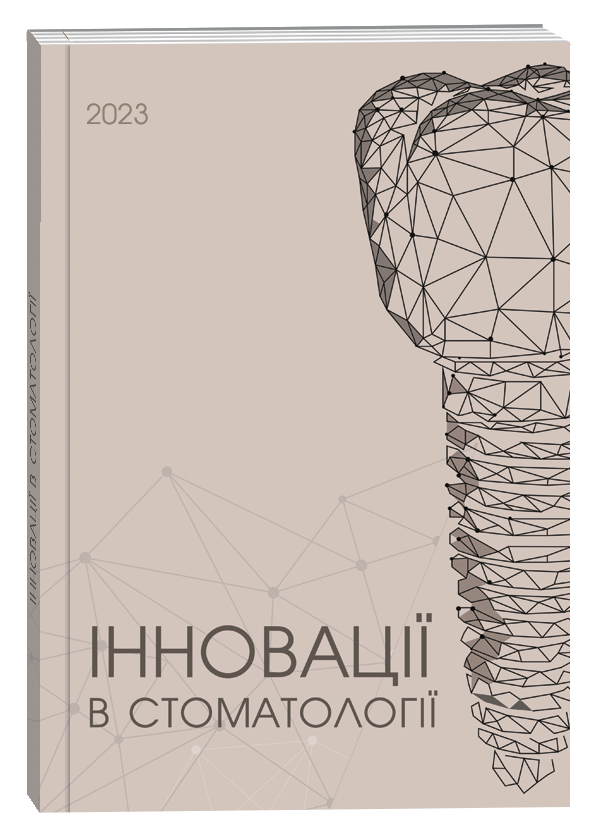ІНДЕКСИ СИСТЕМНОГО ЗАПАЛЕННЯ ЯК НОВІ ПРЕДИКТОРИ РЕЦИДИВУВАННЯ ЗАПАЛЬНИХ ЗАХВОРЮВАНЬ СЛИЗОВОЇ ПОРОЖНИНИ РОТА ПРИ ПОСТ-COVID-19-СИНДРОМІ
DOI:
https://doi.org/10.35220/2523-420X/2025.1.10Ключові слова:
COVID-19; постковідний синдром, біомаркер; індекс системного імунного запалення, сукупний індекс системного запалення; індекс відповіді на системне запаленняАнотація
Мета дослідження. Оцінка зв’язку між системним імунним запаленням за біомаркерами крові – SII, AISI, SIRI та визначення ролі їх рівнів у пацієнтів із ораль- ними проявами пост-COVID-19-синдрому. Методи дослідження. В дослідженні взяли участь 83 пацієнтів (основна група), які звернулися до стоматологічного відділення та мали оральні прояви пост-COVID-19- синдрому з типовими скаргами на біль, кровоточи- вість ясен, одиночні чи множинні ерозії. В 51 особи було діагностовано рецидивуючий герпетичний сто- матит, у 32 осіб – хронічний рецидивуючий афтозний стоматит. До контрольної групи увійшло 35 пацієн- тів із схожими клінічними характеристиками, проте без COVID-19 в анамнезі. Зразки крові з були відібрані оцінки загального та диференційованого підрахунку лейкоцитів із використанням автоматизованого гематологічного аналізатора HEMIX-5 (SFRI, Фран- ція). Визначали стан системного запалення шляхом розрахунку індекса системного імунного запалення SII, сукупного індекса системного запалення AISI та індекса системної реакції на запалення SIRI. Наукова новизна. Встановлено, що пацієнти з пост-COVID- 19-синдромом мали вищі рівні лейкоцитів, вищим був і рівень нейтрофілів і моноцитів, ніж пацієнти групи контролю. Однак, у хворих із пост-ковідним синдро- мом були нижчі значення рівня лімфоцитів порівняно з пацієнтами без COVID-19 в анамнезі. Параметри проведеного гематологічного скринінгу показали висо- кий рівень SII в пацієнтів із оральними проявами пост- ковідного синдрому порівняно з пацієнтами без перене- сеного COVID-19 в анамнезі. Значення показника AISI в пацієнтів із тривалим COVID-19 у 1,93 раза пере- вищував показник пацієнтів групи контролю. Індекс відповіді на системне запалення SIRI в пацієнтів ізтривалим COVID-19 на 59,1 % більшим, ніж у пацієн- тів без ковідної історії. Висновки. Підвищені рівні SII, AISI та SIRI можуть служити потенційним предик- тором подальшого рецидивування ерозивних уражень СОПР у пацієнтів із пост-COVID-19-синдромом.
Посилання
Tang N., Kido T., Shi J., McCafferty E., Ford J. M., Dal Bon K., Pulliam L. Blood Markers Show Neural Consequences of LongCOVID-19. Cells. 2024. No 13(6). P. 478. URL: https://doi.org/10.3390/cells13060478
Thaweethai T., Jolley S. E., Karlson E. W., Levitan E. B., Levy B. et al. Development of a Definition of Postacute Sequelae of SARS-CoV-2 Infection. JAMA. 2023. No 329(22). Р. 1934–1946. URL: https://doi.org/ 10.1001/jama.2023.8823
WHO. A clinical case definition of post COVID-19 condition by a Delphi consensus. URL: https://www.who.int/publications/i/item/WHO-2019-nCoV-Post_COVID-19_condition-Clinical_case_definition-2021.1
Lippi G., Sanchis-Gomar F., Henry B.M. COVID- 19 and its long-term sequelae: what do we know in 2023? Pol Arch Intern Med. 2023. No 133(4):16402. URL: https://doi.org/10.20452/pamw.16402
Hill E. L, Mehta H. B, Sharma S., Mane K., Singh S. K. et al. Risk factors associated with post-acute sequelae of SARS-CoV-2: an N3C and NIH RECOVER study. BMC Public Health. 2023. No 23(1). P. 2103. URL: https://doi.org/10.1186/s12889-023-16916-w
Stephenson T., Allin, B., Rojas, N., Dalrymple, E., Pinto Pereira et al. Long COVID (post-COVID-19 condition) in children: a modified Delphi process. Archives of Disease in Childhood. 2022. No 107(7). P. 674–680. URL: https://doi.org/10.1136/archdischild-2021-323624
Peter R. S., Nieters A., Göpel S., Merle U., Steinacker J.M. et al. Persistent symptoms and clinical findings in adults with post-acute sequelae of COVID-19/ post-COVID-19 syndrome in the second year after acute infection: A population-based, nested case-control study. PLoS Med. 2025. No 22(1). e1004511. URL: https://doi.org/ 10.1371/journal.pmed.1004511
Baissary J., Koberssy Z., Ailstock K., Cummings M., Funderburg N. T., McComsey G. A. Vitamins K2 and D3 Improve Long COVID, Fungal Translocation, and Inflammation: Randomized Controlled Trial. Nutrients. 2025. No 17(2). P. 304. URL: https://doi.org/10.3390/ nu17020304
Atieh O., Daher J., Durieux J. C., Abboud M., Labbato D. et al. Vitamins K2 and D3 Improve Long COVID, Fungal Translocation, and Inflammation: Randomized Controlled Trial. Nutrients. 2025. No 17(2). P. 304. URL: https://doi.org/10.3390/nu17020304
Akın Y., Karasu M., Deniz A., Mirzaoğlu Ç., Bolayır H.A. Predictive value of the systemic immune inflammatory index in cardiac syndrome x. BMC Cardiovasc Disord. 2023. No 23(1). P. 146. URL: https://doi.org/10.1186/s12872-023-03157-3
Candemir M., Kiziltunç E., Nurkoç S., Şahinars lan A. Relationship Between Systemic Immune-Inflammation Index (SII) and the Severity of Stable Coronary Artery Disease. Angiology. 2021. No 72(6). P. 575–581. URL: https://doi.org/10.1177/0003319720987743
Hu B., Yang X. R., Xu Y., Sun Y. F., Sun C. et al. Systemic immune-inflammation index predicts prognosis of patients after curative resection for hepatocellular carcinoma. Clin Cancer Res. 2014. No 20(23). P. 6212–6222. URL: https://doi.org/10.1158/1078-0432.CCR-14-0442
Yaşar E., Bayramoğlu A. Systemic Immune- Inflammation Index as a Predictor of Microvascular Dysfunction in Patients With Cardiac Syndrome X. Angiology. 2022. No 73(7). P. 615–621. URL: https://doi.org/10.1177/00033197221087777
Ustundag Y., Huysal K., Gecgel S.K., Unal D. Relationship between C-reactive protein systemic immune- inflammation index and routine hemogram-related inflammatory markers in low-grade inflammation. Int J Med Biochem. 2018. No 1(1). P. 24–28. URL: https://doi.org/10.14744/ijmb.2017.08108
Zhang C., Li M., Liu L., Deng L., Yulei X. et al. Systemic immune-inflammation index as a novel predictor of major adverse cardiovascular events in patients undergoing percutaneous coronary intervention: a meta-analysis of cohort studies. BMC Cardiovasc Disord. 2024. No 24(1). P. 189. URL: https://doi.org/10.1186/s12872-024-03849-4
Erdoğan M., Erdöl M. A., Öztürk S., Durmaz T. Systemic immune-inflammation index is a novel marker to predict functionally significant coronary artery stenosis. Biomark Med. 2020. No 14(16). P. 1553–1561. URL: https://doi.org/10.2217/bmm-2020-0274
Huang Y., Gao Y., Wu Y., Lin H. Prognostic value of systemic immune-inflammation index in patients with urologic cancers: a meta-analysis. Cancer Cell Int. 2020. No 20. P. 499. URL: https://doi.org/10.1186/s12935-020-01590-4
Zinellu A., Collu C., Nasser M., Paliogiannis P., Mellino S. et al. The Aggregate Index of Systemic Inflammation (AISI): A Novel Prognostic Biomarker in Idiopathic Pulmonary Fibrosis. J Clin Med. 2021. No 10(18). P. 4134. URL: https://doi.org/10.3390/ jcm10184134
Jiang Y., Luo B., Lu W., Chen Y., Peng Y. et al. Association Between the Aggregate Index of Systemic Inflammation and Clinical Outcomes in Patients with Acute Myocardial Infarction: A Retrospective Study. J Inflamm Res. 2024. No 17. P. 7057–7067. URL: https://doi.org/10.2147/JIR.S481515
Qi Q., Zhuang L., Shen Y., Geng Y., Yu S. et al. A novel systemic inflammation response index (SIRI) for predicting the survival of patients with pancreatic cancer after chemotherapy. Cancer. 2016. No 122(14). P. 2158–2167. URL: https://doi.org/10.1002/cncr.30057
Ru S., Luo Y. The association and prognostic value of systemic inflammatory response index with short and long-term mortality in patients with sepsis. Medicine (Baltimore). 2023. No 102(29). e33967. URL: https://doi.org/10.1097/MD.0000000000033967
Luo S., Liu Z., Jiao R., Li W., Sun J. et al. The associations of two novel inflammation indexes, systemic immune-inflammation index (SII) and system inflammation response index (SIRI), with periodontitis: evidence from NHANES 2009-2014. Clin Oral Investig. 2024. No 28(2). P. 129. URL: https://doi.org/10.1007/s00784-024-05529-1
Ren Z., Xue Y., Zhang H., Guo T., Yi W. et al. Systemic Immune-Inflammation Index and Systemic Inflammation Response Index are Associated With Periodontitis: Evidence From NHANES 2009 to 2014. Int Dent J. 2024. No 74(5). P. 1033–1043. URL: https://doi.org/10.1016/j.identj.2024.03.019
Cho U., Sung Y. E., Kim M. S., Lee Y. S. Prognostic Role of Systemic Inflammatory Markers in Patients Undergoing Surgical Resection for Oral Squamous Cell Carcinoma. Biomedicines. 2022. No 10(6). P. 1268. URL: https://doi.org/10.3390/biomedicines10061268
Костюк В. О. Прикладна статистика: навч. посібник. Харків: ХНУМГ ім. О. М. Бекетова. 2015. 191 с. URL: https://duikt.edu.ua/ua/lib/1/category/2139/view/1631
Palchevskyі T. V., Gevkaliuk N. O. Candida albicans colonization of the mucous membrane in acute manifestations of COVID-associated oral candidasis. Regulatory Mechanisms in Biosystems. 2025. 33(1). e25013. URL: https://doi.org/10.15421/0225013
Giron L. B., Peluso M. J., Ding J., Kenny G., Zilberstein N. F. et al. Markers of fungal translocation are elevated during post-acute sequelae of SARS-CoV-2 and induce NF-κB signaling. JCI Insight. 2022. No 7(18). e164813. URL: doi: 10.1172/jci.insight.164813. Erratum for: JCI Insight. 2022. No 7(15):e160989. URL: https://doi.org/10.1172/jci.insight.160989
Levy Y., Derazne E., Shilovsky A., Kagansky D., Derkath A. et al. Neutrophil to lymphocyte ratio and platelet to lymphocyte ratio, are they markers of COVID-19 severity or old age and frailty? A comparison of two distinct cohorts. Front Med (Lausanne). 2023. No 10. Р. 1222692. URL: https://doi.org/10.3389/fmed.2023.1222692
Гевкалюк Н., Пальчевський Т. Використання маркерів запалення для стратифікації захворювань слизової оболонки порожнини рота пацієнтів у постковідному періоді. Вісник стоматології. 2024. No 129(4). P. 2–8. URL: https://doi.org/10.35220/2078-8916-2024-54-4.1
##submission.downloads##
Опубліковано
Як цитувати
Номер
Розділ
Ліцензія

Ця робота ліцензується відповідно до Creative Commons Attribution 4.0 International License.







